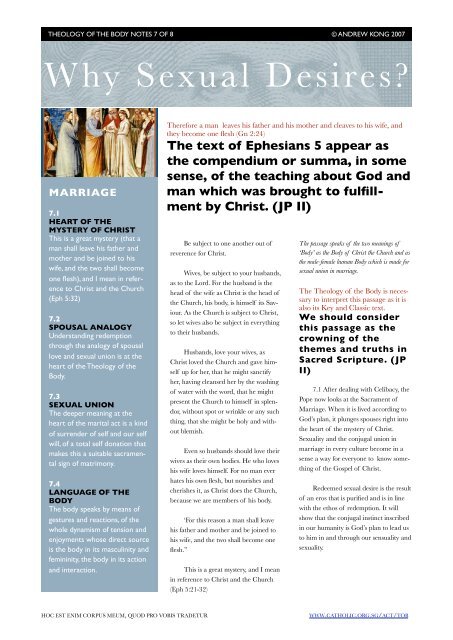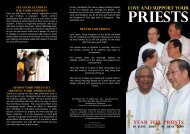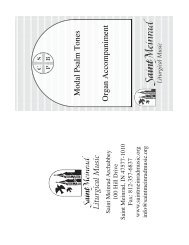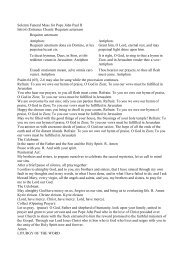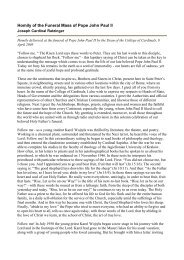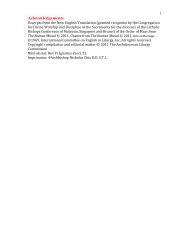Why Sexual Desires?
Why Sexual Desires?
Why Sexual Desires?
Create successful ePaper yourself
Turn your PDF publications into a flip-book with our unique Google optimized e-Paper software.
THEOLOGY OF THE BODY NOTES 7 OF 8 ! © ANDREW KONG 2007<br />
<strong>Why</strong> <strong>Sexual</strong> <strong>Desires</strong><br />
MARRIAGE<br />
7.1<br />
HEART OF THE<br />
MYSTERY OF CHRIST<br />
This is a great mystery (that a<br />
man shall leave his father and<br />
mother and be joined to his<br />
wife, and the two shall become<br />
one flesh), and I mean in reference<br />
to Christ and the Church<br />
(Eph 5:32)<br />
7.2<br />
SPOUSAL ANALOGY<br />
Understanding redemption<br />
through the analogy of spousal<br />
love and sexual union is at the<br />
heart of the Theology of the<br />
Body.<br />
7.3<br />
SEXUAL UNION<br />
The deeper meaning at the<br />
heart of the marital act is a kind<br />
of surrender of self and our self<br />
will, of a total self donation that<br />
makes this a suitable sacramental<br />
sign of matrimony.<br />
7.4<br />
LANGUAGE OF THE<br />
BODY<br />
The body speaks by means of<br />
gestures and reactions, of the<br />
whole dynamism of tension and<br />
enjoyments whose direct source<br />
is the body in its masculinity and<br />
femininity, the body in its action<br />
and interaction.<br />
Therefore a man leaves his father and his mother and cleaves to his wife, and<br />
they become one flesh (Gn 2:24)<br />
The text of Ephesians 5 appear as<br />
the compendium or summa, in some<br />
sense, of the teaching about God and<br />
man which was brought to fulfillment<br />
by Christ. (JP II)<br />
Be subject to one another out of<br />
reverence for Christ.<br />
Wives, be subject to your husbands,<br />
as to the Lord. For the husband is the<br />
head of the wife as Christ is the head of<br />
the Church, his body, is himself its Saviour.<br />
As the Church is subject to Christ,<br />
so let wives also be subject in everything<br />
to their husbands.<br />
Husbands, love your wives, as<br />
Christ loved the Church and gave himself<br />
up for her, that he might sanctify<br />
her, having cleansed her by the washing<br />
of water with the word, that he might<br />
present the Church to himself in splendor,<br />
without spot or wrinkle or any such<br />
thing, that she might be holy and without<br />
blemish.<br />
Even so husbands should love their<br />
wives as their own bodies. He who loves<br />
his wife loves himself. For no man ever<br />
hates his own flesh, but nourishes and<br />
cherishes it, as Christ does the Church,<br />
because we are members of his body.<br />
‘For this reason a man shall leave<br />
his father and mother and be joined to<br />
his wife, and the two shall become one<br />
flesh.”<br />
This is a great mystery, and I mean<br />
in reference to Christ and the Church<br />
(Eph 5:21-32)<br />
The passage speaks of the two meanings of<br />
‘Body’ as the Body of Christ the Church and as<br />
the male-female human Body which is made for<br />
sexual union in marriage.<br />
The Theology of the Body is necessary<br />
to interpret this passage as it is<br />
also its Key and Classic text.<br />
We should consider<br />
this passage as the<br />
crowning of the<br />
themes and truths in<br />
Sacred Scripture. ( JP<br />
II)<br />
7.1 After dealing with Celibacy, the<br />
Pope now looks at the Sacrament of<br />
Marriage. When it is lived according to<br />
God’s plan, it plunges spouses right into<br />
the heart of the mystery of Christ.<br />
<strong>Sexual</strong>ity and the conjugal union in<br />
marriage in every culture become in a<br />
sense a way for everyone to know something<br />
of the Gospel of Christ.<br />
Redeemed sexual desire is the result<br />
of an eros that is purified and is in line<br />
with the ethos of redemption. It will<br />
show that the conjugal instinct inscribed<br />
in our humanity is God’s plan to lead us<br />
to him in and through our sensuality and<br />
sexuality.<br />
HOC EST ENIM CORPUS MEUM, QUOD PRO VOBIS TRADETUR<br />
WWW.CATHOLIC.ORG.SG/ACT/TOB
THEOLOGY OF THE BODY NOTES 7 OF 8 ! © ANDREW KONG 2007<br />
The analogy of the body-head becomes<br />
the analogy of groom-bride.<br />
(JP II)<br />
The Spousal Analogy<br />
works to help us understand<br />
the relationship<br />
of Christ and<br />
his Church, and also<br />
to penetrate more<br />
deeply into Christian<br />
marriage. ( JP II)<br />
7.2 The head - body analogy of<br />
Christ and his Church presents spouses<br />
as one organic union, one organism.<br />
In marriage, spouses are called to<br />
mutual subjection through their mutual<br />
submission and self donation to each<br />
other. All this is to be done ‘out of reverence<br />
for Christ’. To be subject is to be<br />
completely given. Therefore mutual<br />
subjection means a reciprocal donation<br />
of self. It is the living out of the spousal<br />
meaning of their bodies, which calls<br />
them to mutual and sincere self-giving.<br />
Christ who gave up his body for his<br />
Bride is the source and model of this self<br />
giving. Giving ourselves this way ‘out of<br />
reverence for Christ’ is a spiritually mature<br />
form of the mutual attraction of the<br />
sexes. This comes from experiencing<br />
redeemed sexual attraction and sexual<br />
desires in our lives.<br />
Through sexual union, they become<br />
one flesh. Thus the indissoluble<br />
union of Christ and his Church is imaged<br />
through the indissolubility of sacramental<br />
marriage.<br />
Without appreciating and living the<br />
mystery of the indissoluble union of<br />
Christ and his Church or of God and his<br />
People, it is difficult to understand the<br />
teaching of Christian revelation on the<br />
indissolubility of Christian marriages.<br />
This is My Body Given Up for You<br />
St Paul’s linking of<br />
the ‘one flesh’ union<br />
with the union of<br />
Christ and the<br />
Church is the most<br />
important point of<br />
the whole text, in a<br />
sense, the keystone.<br />
( JP II)<br />
7.3 <strong>Sexual</strong> union is the sacramental<br />
sign of marriage. The sacramentality of<br />
the body is uniquely expressed in the<br />
conjugal union.<br />
Jesus at his cruxificion, in his self<br />
gift to the Father, is at the same time<br />
giving himself for the Church. ‘Redeeming<br />
love transforms itself into spousal<br />
love by Christ’s act of giving himself for<br />
the Church, with the same redeeming<br />
act. In this way, the mystery of the redemption<br />
of the body conceals within<br />
itself in some sense the mystery “of the<br />
marriage of the Lamb” (Rev 19:7)’ (JP<br />
II)<br />
Just as the words of Christ (This is<br />
my Body given up for you) at the institution<br />
of the Eucharist at the last supper<br />
‘were made flesh’ on Calvery, spouses in<br />
the conjugal union ‘make flesh’ the<br />
words of their matrimonial vows. In a<br />
sense, the spouses through their bodily<br />
and sexual union say to each other: ‘This<br />
is my body given up for you’. The marital<br />
act consummates and actualize marriage,<br />
and the wedding vows are renewed<br />
and become flesh when ‘the two<br />
become one flesh’.<br />
Authentic marital love between the<br />
spouses is healing, redemptive and salvific.<br />
It participates both in the mystery of<br />
creation (through procreation), but also<br />
in the mystery of redemption.<br />
Just as Christ’s love for his Church<br />
makes her holy, holiness for us then is<br />
not a matter of doing but of ‘letting it be<br />
done to us’ (Luk 1:38). It is the Bride’s<br />
response of love to the gift of the Bridegroom.<br />
(JP II)<br />
The entire Christian life bears the<br />
mark of the spousal love of Christ<br />
and the Church. (CCC 1617)<br />
The language of the<br />
body becomes the<br />
language of the liturgy,<br />
because it is on<br />
its basis, on its foundation,<br />
that the sacramental<br />
sign of marriage<br />
is built. ( JP II)<br />
7.4 Conjugal life can then in a sense<br />
be liturgical, when spouses through the<br />
‘language of the body’ transfer the invisible<br />
truths expressed in liturgical language<br />
to the visible world.<br />
<strong>Sexual</strong> union is prophetic if it proclaims<br />
the mystery of God. But there<br />
can be false prophets if we speak lies<br />
with the language of our body.<br />
Carnal love or bodily sexual love is<br />
meant to express the language of agape.<br />
Christ’s love is characterized by four<br />
particular qualities.<br />
First, Christ gives his body freely.<br />
‘No one takes my life from me, I lay it<br />
down of my own accord.’ (Jn 10:18).<br />
Secondly he gives his life totally, without<br />
reservation and unconditionally: ‘He<br />
loved them to the last.’ (Jn 13:1) Thirdly<br />
he gives his body faithfully. ‘I am with<br />
you always.’ (Mt 28:20) And lastly he<br />
gives his body fruitfully. ‘I came that they<br />
may have life.’ (Jn 10:10)<br />
Free (human), total, faithful and<br />
fruitful love then are the characteristics<br />
of marriage and conjugal love. (HV 9)<br />
Ultimately all questions on sexual morality<br />
can be answered by asking if this<br />
moral act images God’s free, total, faithful<br />
and fruitful love or does it not<br />
HOC EST ENIM CORPUS MEUM, QUOD PRO VOBIS TRADETUR<br />
WWW.CATHOLIC.ORG.SG/ACT/TOB


